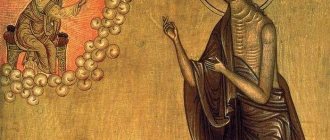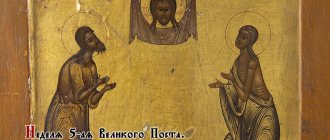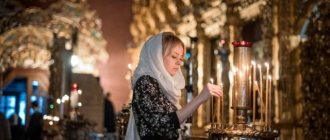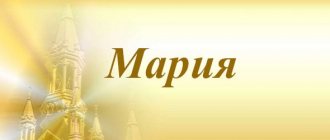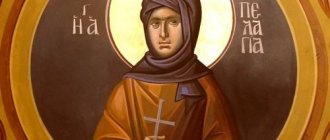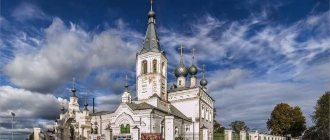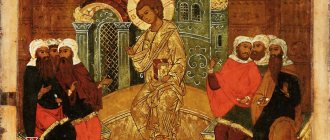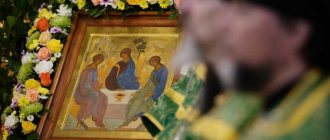Venerable Mary of Egypt
St. Sophronius of Jerusalem - Life of our Venerable Mother Mary of Egypt .
Listen to the life of St. Mary of Egypt:
Brief Life of the Venerable Mary of Egypt
The Venerable Mary, nicknamed the Egyptian, lived in the mid-5th and early 6th centuries. Her youth did not bode well. Mary was only twelve years old when she left her home in the city of Alexandria. Being free from parental supervision, young and inexperienced, Maria became carried away with a vicious life. There was no one to stop her on the path to destruction, and there were many seducers and temptations. So Mary lived in sins for 17 years, until the merciful Lord turned her to repentance.
It happened like this. By coincidence, Mary joined a group of pilgrims heading to the Holy Land. Sailing with pilgrims on the ship, Mary did not stop seducing people and sinning. Once in Jerusalem, she joined the pilgrims heading to the Church of the Resurrection of Christ.
People entered the temple in a wide crowd, but Mary was stopped at the entrance by an invisible hand and could not enter it with any effort. Then she realized that the Lord did not allow her to enter the holy place because of her uncleanness.
Seized with horror and a feeling of deep repentance, she began to pray to God to forgive her sins, promising to radically correct her life. Seeing an icon of the Mother of God at the entrance to the temple, Mary began to ask the Mother of God to intercede for her before God. After this, she immediately felt enlightenment in her soul and entered the temple without hindrance. Shedding copious tears at the Holy Sepulcher, she left the temple as a completely different person.
Mary fulfilled her promise to change her life. From Jerusalem she retired to the harsh and deserted Jordanian desert and there she spent almost half a century in complete solitude, in fasting and prayer. Thus, through severe deeds, Mary of Egypt completely eradicated all sinful desires in herself and made her heart a pure temple of the Holy Spirit.
Elder Zosima, who lived in the Jordan Monastery of St. John the Baptist, by the providence of God, was honored to meet the Venerable Mary in the desert, when she was already an old woman. He was amazed by her holiness and gift of insight. Once he saw her during prayer, as if rising above the earth, and another time, walking across the Jordan River, as if on dry land.
Parting with Zosima, the Monk Mary asked him to come again to the desert a year later to give her communion. The elder returned at the appointed time and communed the Reverend Mary with the Holy Mysteries. Then, coming to the desert another year later in the hope of seeing the saint, he no longer found her alive. The elder buried the remains of St. Mary there in the desert, in which he was helped by a lion, who with his claws dug a hole for burying the body of the righteous woman. This was around 521.
Thus, from a great sinner, the Venerable Mary became, with God’s help, the greatest saint and left such a vivid example of repentance.
Complete Life of Venerable Mary of Egypt
In a Palestinian monastery in the vicinity of Caesarea lived the monk Zosima. Sent to a monastery from childhood, he labored there until he was 53 years old, when he was confused by the thought: “Will there be a holy man in the most distant desert who has surpassed me in sobriety and work?”
As soon as he thought this way, an Angel of the Lord appeared to him and said: “You, Zosimas, labored well in human measure, but among men there is not a single righteous one (Rom. 3:10). So that you understand how many other and higher forms of salvation there are, leave this monastery, like Abraham from his father’s house (Gen. 12:1), and go to the monastery located near the Jordan.”
Abba Zosima immediately left the monastery and, following the Angel, came to the Jordan monastery and settled in it.
Here he saw the elders, truly shining in their exploits. Abba Zosima began to imitate the holy monks in spiritual work.
So a lot of time passed, and the Holy Pentecost approached. There was a custom in the monastery, for the sake of which God brought St. Zosima here. On the first Sunday of Great Lent, the abbot served the Divine Liturgy, everyone partook of the Most Pure Body and Blood of Christ, then ate a small meal and gathered again in the church.
Having made a prayer and the prescribed number of prostrations to the ground, the elders, having asked each other for forgiveness, took a blessing from the abbot and under the general singing of the psalm “The Lord is my enlightenment and my Savior: whom will I fear? The Lord is the Protector of my life: from whom shall I fear?” (Ps. 26:1) they opened the monastery gates and went into the desert.
Each of them took with him a moderate amount of food, whoever needed what, some did not take anything into the desert at all and ate roots. The monks crossed the Jordan and dispersed as far as possible so as not to see anyone fasting and asceticism.
When Lent ended, the monks returned to the monastery on Palm Sunday with the fruit of their work (Rom. 6:21-22), having examined their conscience (1 Pet. 3:16). At the same time, no one asked anyone how he worked and accomplished his feat.
That year, Abba Zosima, according to monastic custom, crossed the Jordan. He wanted to go deeper into the desert to meet some of the saints and great elders who were saving themselves there and praying for peace.
He walked through the desert for 20 days and one day, when he was singing the psalms of the 6th hour and doing the usual prayers, suddenly a shadow of a human body appeared to his right. He was horrified, thinking that he was seeing a demonic ghost, but, having crossed himself, he put aside his fear and, having finished the prayer, turned towards the shadow and saw a naked man walking through the desert, whose body was black from the heat of the sun, and his short, bleached hair turned white like a lamb’s fleece. . Abba Zosima was delighted, since during these days he had not seen a single living creature, and immediately headed in his direction.
But as soon as the naked hermit saw Zosima coming towards him, he immediately began to run away from him. Abba Zosima, forgetting his old age's infirmity and fatigue, quickened his pace. But soon, exhausted, he stopped at a dry stream and began to tearfully beg the retreating ascetic: “Why are you running from me, a sinful old man, saving yourself in this desert? Wait for me, weak and unworthy, and give me your holy prayer and blessing, for the sake of the Lord, who has never disdained anyone.”
The unknown man, without turning around, shouted to him: “Forgive me, Abba Zosima, I cannot, having turned, appear to your face: I am a woman, and, as you can see, I have no clothes on to cover my bodily nakedness. But if you want to pray for me, a great and damned sinner, throw me your cloak to cover yourself, then I can come to you for a blessing.”
“She would not have known me by name if through holiness and unknown deeds she had not acquired the gift of clairvoyance from the Lord,” thought Abba Zosima and hastened to fulfill what was said to him.
Covering herself with a cloak, the ascetic turned to Zosima: “What did you think, Abba Zosima, to talk to me, a sinful and unwise woman? What do you want to learn from me and, sparing no effort, you spent so much work? He, kneeling down, asked her blessing. In the same way, she bowed down before him, and for a long time both of them asked each other: “Bless.” Finally the ascetic said; “Abba Zosima, it is fitting for you to bless and say a prayer, since you have been honored with the rank of presbyterate and for many years, standing at the altar of Christ, you have offered the Holy Gifts to the Lord.”
These words frightened the Monk Zosima even more. With a deep sigh he answered her: “O spiritual mother! It is clear that you, of the two of us, have come closer to God and died for the world. You recognized me by name and called me presbyter, having never seen me before. It is your duty to bless me for the Lord’s sake.”
Finally yielding to Zosima’s stubbornness, the saint said: “Blessed is God, who desires the salvation of all people.” Abba Zosima answered “Amen,” and they rose from the ground. The ascetic again said to the elder: “Why did you come, father, to me, a sinner, devoid of all virtue? However, it is clear that the grace of the Holy Spirit directed you to perform one service that my soul needed. Tell me first, Abba, how do Christians live today, how do the saints of God’s Church grow and prosper?”
Abba Zosima answered her: “Through your holy prayers, God gave the Church and us all perfect peace. But heed the prayer of the unworthy old man, my mother, pray, for God’s sake, for the whole world and for me, a sinner, so that this deserted walk will not be fruitless for me.”
The holy ascetic said: “You should rather, Abba Zosima, having a sacred rank, pray for me and for everyone. That's why you were given the rank. However, I will willingly fulfill everything you commanded me for the sake of obedience to the Truth and from a pure heart.”
Having said this, the saint turned to the east and, lifting her eyes and raising her hands to the sky, began to pray in a whisper. The elder saw how she rose in the air an elbow from the ground. From this wonderful vision, Zosima prostrated himself, praying fervently and not daring to say anything other than “Lord, have mercy!”
A thought came into his soul - was it a ghost leading him into temptation? The venerable ascetic, turning around, lifted him from the ground and said: “Why are you so confused by your thoughts, Abba Zosima? I'm not a ghost. I am a sinful and unworthy woman, although I am protected by holy baptism.”
Having said this, she made the sign of the cross. Seeing and hearing this, the elder fell with tears at the feet of the ascetic: “I beg you, by Christ our God, do not hide your ascetic life from me, but tell it all, in order to make the greatness of God clear to everyone. For I believe in the Lord my God, and by Him you also live, that for this reason I was sent into this desert, so that God would make all your fasting deeds obvious to the world.”
And the holy ascetic said: “I am embarrassed, father, to tell you about my shameless deeds. For then you will have to run from me, closing your eyes and ears, as one runs from a poisonous snake. But still I will tell you, father, without keeping silent about any of my sins, I conjure you, do not stop praying for me, a sinner, so that I will find boldness on the Day of Judgment.
I was born in Egypt and while my parents were still alive, when I was twelve years old, I left them and went to Alexandria. There I lost my chastity and indulged in uncontrollable and insatiable fornication. For more than seventeen years I indulged in sin without restraint and did everything for free. I didn't take money not because I was rich. I lived in poverty and made money from yarn. I thought that the whole meaning of life was to satisfy carnal lust.
While leading such a life, I once saw a multitude of people from Libya and Egypt going to the sea to sail to Jerusalem for the Feast of the Exaltation of the Holy Cross. I also wanted to sail with them. But not for the sake of Jerusalem and not for the sake of the holiday, but - forgive me, father - so that there would be more with whom to indulge in debauchery. So I boarded the ship.
Now, father, believe me, I myself am surprised how the sea tolerated my debauchery and fornication, how the earth did not open its mouth and bring me alive to hell, which deceived and destroyed so many souls... But, apparently, God wanted my repentance, despite the death of the sinner and patiently awaiting conversion.
So I arrived in Jerusalem and all the days before the holiday, as on the ship, I was engaged in bad deeds.
When the holy holiday of the Exaltation of the Venerable Cross of the Lord arrived, I still walked around, catching the souls of young people in sin. Seeing that everyone went to the church very early, where the Life-Giving Tree was located, I went with everyone and entered the church vestibule. When the hour of the Holy Exaltation arrived, I wanted to enter the church with all the people. Having made my way to the doors with great difficulty, I, damned, tried to squeeze inside. But as soon as I stepped on the threshold, some divine force stopped me, not allowing me to enter, and threw me far from the door, while all the people walked unhindered. I thought that, perhaps, due to female weakness, I could not squeeze through the crowd, and again I tried to push the people away with my elbows and make my way to the door. No matter how hard I worked, I couldn’t get in. As soon as my foot touched the church threshold, I stopped. The church accepted everyone, did not forbid anyone to enter, but I, the accursed one, was not allowed in. This happened three or four times. My strength is exhausted. I walked away and stood in the corner of the church porch.
Then I felt that it was my sins that prevented me from seeing the Life-Giving Tree, my heart was touched by the grace of the Lord, I began to sob and began to beat my chest in repentance. As I lifted up sighs to the Lord from the depths of my heart, I saw before me an icon of the Most Holy Theotokos and turned to her with a prayer: “O Virgin, Lady, who gave birth to God the Word in the flesh! I know that I am unworthy to look at Your icon. It is righteous for me, a hated harlot, to be rejected from Your purity and to be an abomination to You, but I also know that for this purpose God became man, in order to call sinners to repentance. Help me, Most Pure One, may I be allowed to enter the church. Do not forbid me to see the Tree on which the Lord was crucified in His flesh, shedding His innocent Blood for me, a sinner, for my deliverance from sin. Command, Lady, that the doors of the holy worship of the Cross may be opened for me too. Be my valiant Guarantor to Him who was born of You. I promise You from now on not to defile myself any more with any carnal defilement, but as soon as I see the Tree of the Cross of Your Son, I will renounce the world and immediately go to where You, as the Surety, will guide me.”
And when I prayed like that, I suddenly felt that my prayer had been heard. In the tenderness of faith, hoping in the Merciful Mother of God, I again joined those entering the temple, and no one pushed me aside or prevented me from entering. I walked in fear and trembling until I reached the door and was honored to see the Life-giving Cross of the Lord.
This is how I learned the mysteries of God and that God is ready to accept those who repent. I fell to the ground, prayed, kissed the shrines and left the temple, hastening to appear again before my Surety, where I had made a promise. Kneeling before the icon, I prayed like this before it:
“Oh, our Benevolent Lady and Mother of God! You did not abhor my unworthy prayer. Glory to God, who accepts the repentance of sinners through You. The time has come for me to fulfill the promise in which You were the Guarantor. Now, Lady, guide me on the path of repentance.”
And so, not yet finishing my prayer, I hear a voice, as if speaking from afar: “If you cross the Jordan, you will find blissful peace.”
I immediately believed that this voice was for me, and, crying, I exclaimed to the Mother of God: “Lady Lady, do not leave me, a nasty sinner, but help me,” and immediately left the church vestibule and walked away. One man gave me three copper coins. With them I bought myself three loaves of bread and from the seller I learned the way to the Jordan.
At sunset I reached the Church of St. John the Baptist near the Jordan. Having bowed first of all in the church, I immediately went down to the Jordan and washed his face and hands with holy water. Then I took communion in the Church of St. John the Baptist of the Most Pure and Life-Giving Mysteries of Christ, ate half of one of my breads, washed it down with holy Jordanian water and slept that night on the ground near the temple. The next morning, having found a small canoe not far away, I crossed the river in it to the other bank and again fervently prayed to my Mentor that She would direct me as She herself would please. Immediately after that I came to this desert.”
Abba Zosima asked the monk: “How many years, my mother, have passed since you settled in this desert?” “I think,” she answered, “47 years have passed since I left the Holy City.”
Abba Zosima asked again: “What do you have or what do you find for food here, my mother?” And she answered: “I had two and a half loaves with me when I crossed the Jordan, little by little they dried up and turned to stone, and, eating little by little, I ate from them for many years.”
Abba Zosima asked again: “Have you really been without illness for so many years? And didn’t you accept any temptations from sudden excuses and temptations?” “Believe me, Abba Zosima,” answered the saint, “I spent 17 years in this desert, as if with fierce beasts, struggling with my thoughts... When I began to eat food, the thought of meat and fish immediately came to me, to which I was accustomed in the past.” Egypt. I also wanted wine, because I drank a lot of it when I was out in the world. Here, often without simple water and food, I suffered fiercely from thirst and hunger. I also suffered more severe disasters: I was overcome by the desire for fornicating songs, as if I heard them, confusing my heart and ears. Crying and beating my chest, I then remembered the vows that I made while going into the desert, before the icon of the Holy Mother of God, my Handmaid, and cried, begging to drive away the thoughts that were tormenting my soul. When repentance was accomplished through prayer and crying, I saw a Light shining from everywhere, and then, instead of a storm, a great silence surrounded me.
Forgone thoughts, forgive me, Abba, how can I confess them to you? A passionate fire flared up inside my heart and scorched me all over, arousing lust. When cursed thoughts appeared, I threw myself to the ground and seemed to see that the Most Holy Surety Herself was standing before me and judging me for breaking my promise. So I did not get up, lying prostrate day and night on the ground, until repentance was accomplished again and I was surrounded by the same blessed Light, driving away evil confusion and thoughts.
This is how I lived in this desert for the first seventeen years. Darkness after darkness, misfortune after misfortune befell me, a sinner. But from that time until now, the Mother of God, my Helper, guides me in everything.”
Abba Zosima asked again: “Did you really need neither food nor clothing here?”
She answered: “My bread ran out, as I said, in these seventeen years. After that, I began to eat roots and what I could find in the desert. The dress that I was wearing when I crossed the Jordan had long been torn and decayed, and then I had to endure a lot and suffer from both the heat, when the heat scorched me, and the winter, when I was shaking from the cold. How many times have I fallen to the ground as if dead. How many times have I been in immeasurable struggle with various misfortunes, troubles and temptations? But from that time until this day, the power of God has protected my sinful soul and humble body in unknown and varied ways. I was nourished and covered with the word of God, which contains all things (Deut. 8:3), for man shall not live on bread alone, but on every word of God (Matt. 4:4; Luke 4:4), and those who are not covered with stones will be clothed (Job.24:8), if they have taken off the garment of sin (Col.3:9). As I remembered how much evil and what sins the Lord had delivered me from, I found inexhaustible food in that.”
When Abba Zosima heard that the holy ascetic was speaking from the Holy Scriptures in memory - from the books of Moses and Job and from the Psalms of David - then he asked the venerable one: “Where, my mother, did you learn the psalms and other Books?”
She smiled after listening to this question and answered: “Believe me, man of God, I have not seen a single person except you since I crossed the Jordan. I had never studied books before, I had never heard church singing or Divine reading. Unless the Word of God itself, living and all-creative, teaches man all understanding (Col. 3:16; 2 Pet. 1:21; 1 Thess. 2:13). However, enough, I have already confessed my whole life to you, but where I began is where I end: I conjure you as the incarnation of God the Word - pray, holy Abba, for me, a great sinner.
And I also adjure you, by our Savior, our Lord Jesus Christ, that you do not tell anything that you have heard from me until God takes me from the earth. And do what I tell you now. Next year, during Lent, do not go beyond the Jordan, as your monastic custom commands.”
Again Abba Zosima was surprised that their monastic order was known to the holy ascetic, although he did not say a single word about it to her.
“Stay, Abba,” the saint continued, “in the monastery. However, even if you want to leave the monastery, you will not be able... And when the holy Great Thursday of the Lord’s Last Supper comes, put the Life-giving Body and Blood of Christ our God into the holy vessel and bring it to me. Wait for me on the other side of the Jordan, at the edge of the desert, so that when I come, I will receive communion of the Holy Mysteries. And say to Abba John, abbot of your monastery: take heed to yourself and to your flock (1 Tim. 4:16). However, I don’t want you to tell him this now, but when the Lord indicates.”
Having said this and asking for prayers again, the saint turned and went into the depths of the desert.
All year Elder Zosima remained in silence, not daring to reveal to anyone what the Lord had revealed to him, and he diligently prayed that the Lord would grant him the privilege of seeing the holy ascetic once again.
When the first week of Holy Great Lent began again, the Monk Zosima, due to illness, had to remain in the monastery. Then he remembered the prophetic words of the saint that he would not be able to leave the monastery. After several days, the Monk Zosima was healed of his illness, but still remained in the monastery until Holy Week.
The day of remembering the Last Supper has approached. Then Abba Zosima fulfilled what he was commanded - late in the evening he left the monastery to the Jordan and sat down on the shore, waiting. The saint hesitated, and Abba Zosima prayed to God that He would not deprive him of a meeting with the ascetic.
Finally the saint came and stood on the other side of the river. Rejoicing, the Monk Zosima stood up and glorified God. A thought occurred to him: how could she get across the Jordan without a boat? But the saint, having crossed the Jordan with the sign of the cross, quickly walked on the water. When the elder wanted to bow to her, she forbade him, shouting from the middle of the river: “What are you doing, Abba? After all, you are a priest, a bearer of the great Mysteries of God.”
Having crossed the river, the monk said to Abba Zosima: “Bless, father.” He answered her with trepidation, horrified by the wondrous vision: “Truly God is not lying, who promised to liken to Himself all those who purify themselves, as far as possible, to mortals. Glory to Thee, Christ our God, who showed me through His holy servant how far I fall from the standard of perfection.”
After this, the saint asked him to read “I Believe” and “Our Father.” At the end of the prayer, she, having communed the Holy Terrible Mysteries of Christ, stretched out her hands to heaven and with tears and trembling said the prayer of St. Simeon the God-Receiver: “Now do You let Your servant go, O Master, according to Your word in peace, for my eyes have seen Your salvation.”
Then the monk again turned to the elder and said: “Forgive me, Abba, and fulfill my other desire. Go now to your monastery, and next year come to that dried-up stream where we first talked to you.” “If it were possible for me,” answered Abba Zosima, “to continually follow you to behold your holiness!” The venerable woman again asked the elder: “Pray, for the Lord’s sake, pray for me and remember my curse.” And, making the sign of the cross over the Jordan, she, as before, walked across the waters and disappeared into the darkness of the desert. And Elder Zosima returned to the monastery in spiritual jubilation and awe, and reproached himself for one thing: that he had not asked the name of the saint. But he hoped next year to finally find out her name.
A year passed, and Abba Zosimas again went into the desert. Praying, he reached a dry stream, on the eastern side of which he saw a holy ascetic. She lay dead, with her arms folded, as it should be, on her chest, her face turned to the East. Abba Zosima washed her feet with his tears, not daring to touch her body, wept for a long time over the deceased ascetic and began to sing psalms appropriate for mourning the death of the righteous, and read funeral prayers. But he doubted whether the saint would be pleased if he buried her. As soon as he thought this, he saw that at its head there was an inscription: “Bury, Abba Zosima, in this place the body of the humble Mary. Give dust to dust. Pray to the Lord for me, who reposed in the month of April on the first day, on the very night of Christ’s saving suffering, after communion of the Divine Last Supper.”
Having read this inscription, Abba Zosima was at first surprised who could have made it, for the ascetic herself did not know how to read and write. But he was glad to finally know her name. Abba Zosima understood that the Venerable Mary, having received the Holy Mysteries on the Jordan from his hands, in an instant walked her long desert path, which he, Zosima, had walked for twenty days, and immediately departed to the Lord.
Having glorified God and wet the earth and the body of the Venerable Mary with tears, Abba Zosima said to himself: “It’s time for you, Elder Zosima, to do what you were commanded. But how can you, damned one, dig up a grave without having anything in your hands?” Having said this, he saw a fallen tree lying nearby in the desert, took it and began to dig. But the ground was too dry, no matter how much he dug, sweating profusely, he could not do anything. Straightening up, Abba Zosima saw a huge lion near the body of the Venerable Mary, who was licking her feet. The elder was overcome with fear, but he made the sign of the cross, believing that he would remain unharmed by the prayers of the holy ascetic. Then the lion began to caress the elder, and Abba Zosima, inflamed in spirit, ordered the lion to dig a grave in order to bury the body of Saint Mary. At his word, the lion dug a ditch with its paws, in which the body of the saint was buried. Having fulfilled his will, each went his own way: the lion into the desert, and Abba Zosima into the monastery, blessing and praising Christ our God.
Arriving at the monastery, Abba Zosima told the monks and the abbot what he had seen and heard from the Venerable Mary. Everyone was amazed, hearing about the greatness of God, and with fear, faith and love they established the memory of the Venerable Mary and honor the day of her repose. Abba John, abbot of the monastery, according to the word of the monk, with God’s help, corrected what needed to be done in the monastery. Abba Zosima, having lived a godly life in the same monastery and not quite reaching the age of one hundred, ended his temporary life here, passing into eternal life.
Thus, the ancient ascetics of the glorious monastery of the holy, all-praised Forerunner of the Lord John, located on the Jordan, conveyed to us the wondrous story of the life of the Venerable Mary of Egypt. This story was not originally written down by them, but was reverently passed on by the holy elders from mentors to disciples.
“I,” says Saint Sophronius, Archbishop of Jerusalem (March 11), the first descriptor of the Life, “what I received in my turn from the holy fathers, have committed everything to written history.
May God, who works great miracles and rewards with great gifts all who turn to Him with faith, reward both those who read and listen, and those who conveyed this story to us, and grant us a good share with the blessed Mary of Egypt and with all the saints, who have pleased God with their thoughts of God and their labors from centuries. Let us also give glory to God the Eternal King, and let us also be granted mercy on the Day of Judgment in Christ Jesus our Lord; to Him belongs all glory, honor, and power, and worship with the Father, and the Most Holy and Life-giving Spirit, now and ever and forever and ever, amen.
See also:
- The Life of Our Venerable Mother Mary of Egypt by St. Dimitry Rostovsky
- St. Mary the Egyptian St. Filaret Chernigovsky
- Venerable Mary of Egypt Bishop. Alexander (Mileant)
- Maria of Egypt prof. S.S. Averintsev
- Life of Venerable Mary of Egypt Bishop. Alexander (Svetlakov)
Folk signs for April 14
Folk signs for April 14
People revered Mary of Egypt. April 14 was called “ Marya - light up the snow .” According to popular beliefs, on this day the brownie and the vodyanoi woke up.
Other names of the folk holiday:
- Mary of Egypt;
- Awakening of the Brownie;
- Domovoy's name day;
- Empty cabbage soup;
- First meeting of the flyover;
- Marya - light up the snow, make the ravines play;
- Marya is a liar;
- Mary is a liar;
- Marya the blueberry;
- Marya - snatch the shores.
It was believed that on this day spring finally returned to the earth - that’s why the brownie awakened. To appease him, the peasants jokingly and kindly deceived each other. Out of respect for the Saint, this day was previously spent in abstinence and fasting. They considered it a sin to eat anything other than empty cabbage soup.
Folk signs for April 14:
- Marya is starting to flood.
- If there is a flood on Mary of Egypt, then there will be a lot of grass and early mowing.
- Snow melting, river flooding - good grass.
- The ice breaks quickly - walking is dangerous. If the ice suddenly disappears, the year will be easy and good. If the ice on the river disappears or remains on the shore, the year will be difficult.
- The early flight of bees means a red spring.
- Cattle roar loudly - signifies bad weather.
- Lightning at sunset - predicts imminent rain.
- If you hear a short, rare thunder, as if behind the forest the butt of an ax is hitting a tree, then expect warm and sunny weather.
Venerable Mary of Egypt, whose memory is honored on April 14, is a significant and revered saint in the Russian Orthodox Church. Therefore, on this day you must definitely visit the Temple, pray to her icon, sincerely repenting of your sins. This will be a worthy preparation for the imminent Holy Week.
How to celebrate Maria's name day?
Almost every month there are Maria’s name days. To avoid forgetting and getting confused about dates, buy yourself an Orthodox calendar. With it you will definitely not miss the right day!
Among the Marys there are many teachers, lecturers and doctors. From the outside it may seem that these girls are proud, cold and uncriminal. But this is only at first glance; family and friends know that Mashenka is kind, gentle and affectionate.
The health of these girls is excellent, but you should pay attention to your stomach and heart. It is also necessary to monitor your diet, not overeat and keep yourself in shape.
Maria's girls love an active lifestyle. To maintain health and heart health, it is best for them to visit the pool or walk.
Character of the birthday girl
Maria is extremely smart and talented. She is a person of extraordinary warmth. The girl will never betray and will be a faithful friend throughout her life. Maria, like no one else, is able to live her whole life not for herself, but for the sake of her children, husband, and parents. She is inclined towards philosophy. Very often, bearers of this name become fortune tellers, psychics and good psychoanalysts.
The best article for you, go to: Name days in April for boys and girls according to the church calendar
The girl is quite elegant and has incredible beauty. Maria is an excellent hostess. She always has a lot of gentlemen. Having chosen her chosen one, she always remains faithful to him. In turn, the girl’s husband must remember that she is very emotional and finds it difficult to endure family discord. Due to frequent scandals and quarrels, he may even get sick.
